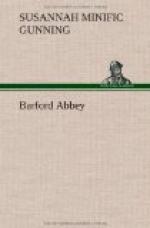She was independent; her fortune noble;—her affections disengag’d.—Mr. Powis returns from Ireland: Lady Mary is then at the Abbey.—Sir James in a few days, without consulting his son, sues for her alliance.—Lady Mary supposes it is with the concurrence of Mr. Powis:—his person,—his character,—his family, were unexceptionable; and generously she declar’d her sentiments in his favour.—Sir James, elated with success, flies to his son;—and in presence of Lady Powis, tells him he has secur’d his happiness.—Mr. Powis’s inclinations not coinciding,—Sir James throws himself into a violent rage.—Covetousness and obstinacy always go hand in hand:—both had taken such fast hold of the Baronet, that he swore—and his oath was without reservation—he would never consent to his son’s marrying any other woman.—Mr. Powis, finding his father determin’d,—and nothing, after his imprecation, to expect from the entreaties of his mother,—strove to forget the person of Lady Mary, and think only of her mind.—Her Ladyship, a little chagrin’d Sir James’s proposals were not seconded by Mr. Powis, pretended immediate business into Oxfordshire.—The Baronet wants not discernment: he saw through her motive; and taking his opportunity, insinuated the violence of his son’s passion, and likewise the great timidity it occasion’d—he even prevail’d on Lady Powis to propose returning with her to Brandon Lodge.
The consequence of this was, the two Ladies set out on their journey, attended by Sir James and Mr. Powis, who, in obedience to his father, was still endeavouring to conquer his indifference.—
Perhaps, in time, the amiable Lady Mary might have found a way to his heart,—had she not introduc’d the very evening of their arrival at the Lodge, her counter-part in every thing but person:—there Miss Whitmore outshone her whole sex.—This fair neighbour was the belov’d friend of Lady Mary Sutton, and soon became the idol of Mr. Powis’s affections, which render’d his situation still more distressing.—His mother’s disinterested tenderness for Lady Mary;—her own charming qualifications;—his father’s irrevocable menace, commanded him one way:—Miss Whitmore’s charms led him another.
Attached as he was to this young Lady, he never appear’d to take the least notice, of her more than civility demanded;—tho’ she was of the highest consequence to his repose, yet the obstacles which surrounded him seem’d insurmountable.
Sir James and Lady Powis retiring one evening earlier than usual,—Lady Mary and Mr. Powis were left alone. The latter appear’d greatly embarrass’d. Her Ladyship eyed him attentively; but instead of sharing his embarrassment,—began a conversation of which Miss Whitmore was the subject.—She talk’d so long of her many excellencies, profess’d such sincerity, such tenderness, for her, that his emotion became visible:—his fine, eyes were full of fire;—his expressive features spoke what she, had long wish’d to discover.—You are silent, Sir, said she, with a smile of ineffable sweetness; is my lovely friend a subject that displeases you?—




